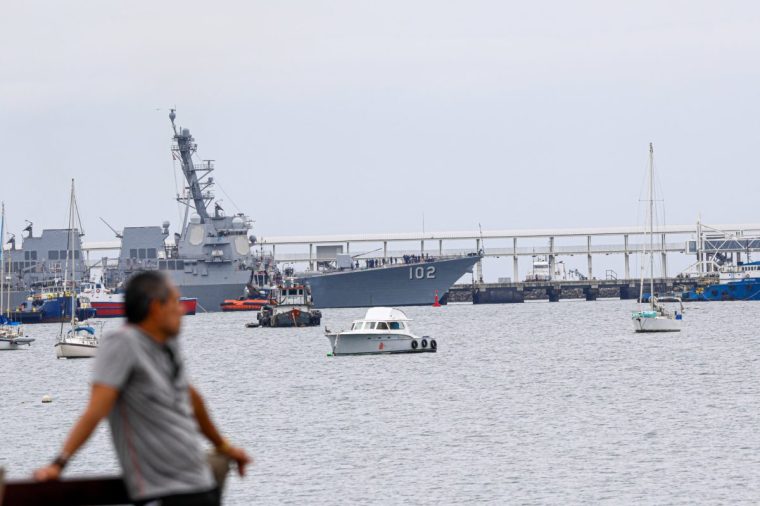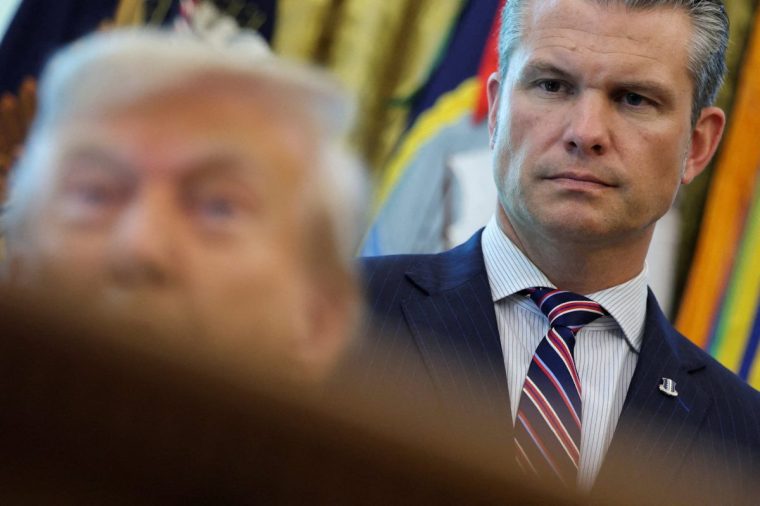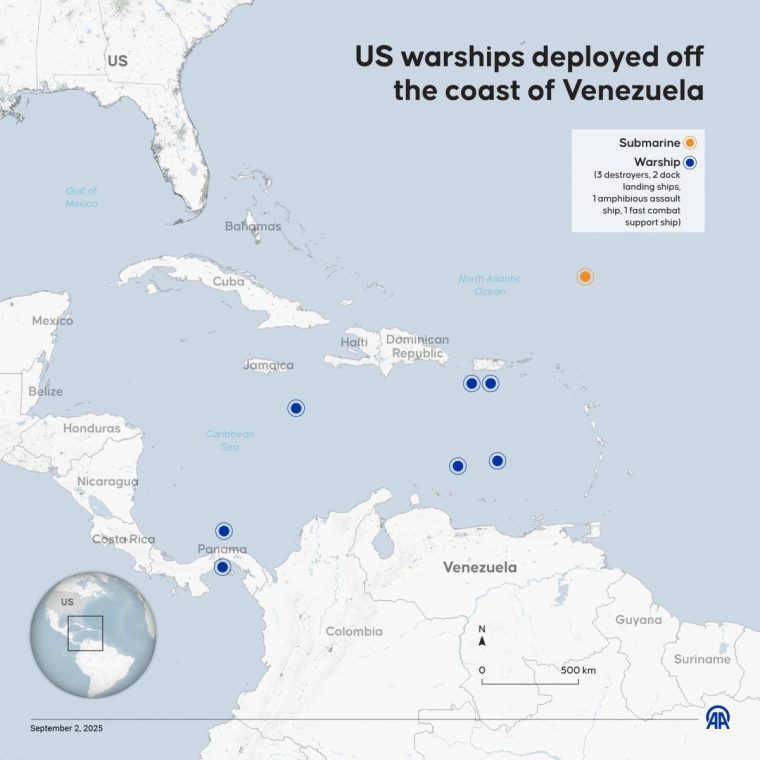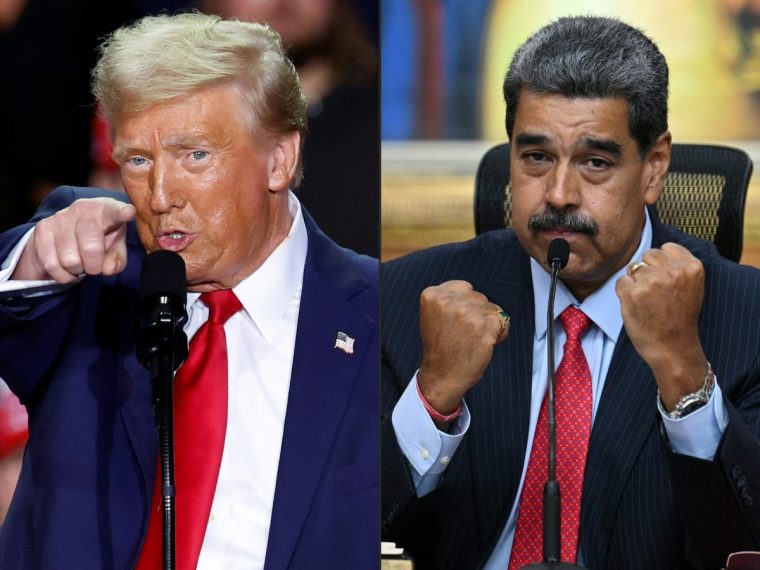US military build-up in the Caribbean continues with Venezuelan regime in the crosshairs
Donald Trump has vowed to continue strikes on suspected drug traffickers in the Caribbean, but specialists are divided on the ultimate goal of an expanding US military mission near Venezuelan waters.
An air strike by US forces on Tuesday killed 11 people onboard a boat the White House claimed were gang members carrying drugs out of Venezuela, without providing evidence.
The deadly attack marked a dramatic shift from typical US anti-narcotics operations, in which boats are boarded and passengers detained.
But defence secretary Pete Hegseth said that the attack was just the start of a new campaign against cartels, while Trump said the killings were necessary to send a message to traffickers.
The US has deployed a force of warships, submarines, and aircraft to the region in recent weeks, a major military build-up that the White House says is part of an anti-drug trafficking operation.
But the Venezuelan government has accused the US of threatening its sovereignty and plotting regime change, with President Nicolás Maduro saying the country was “confronting the biggest threat that has been seen on our continent in the last 100 years”.

Traffickers branded terror threats
Trump has pledged to “wage war” on drug cartels and ordered the State Department to label them as terrorist organisations after taking office in January, including Latin American gangs such as MS-13 and Venezuela’s Tren de Aragua – said to be the target of this week’s attack.
The White House also recently doubled the arrest warrant for Maduro to $50 million (£37m), describing the Venezuelan leader as “one of the largest narco-traffickers in the world.” Caracas dismissed the move as “propaganda”.
Trump is now said to view drug traffickers in the same way as members of designated terror groups the US routinely targets in the Middle East.
“The president’s overall perspective is that, if there is a terrorist threat to the homeland of the US, he trusts the military to take that threat out — whether it’s a drug boat off the coast of Venezuela or an al-Qaeda terrorist in the Middle East,” a senior administration official told US outlet Axios.
Trump shared footage of the attack on Tuesday, warning “there’s more where that came from” and telling reporters that the boat had been carrying “a lot of drugs” which were “pouring” out of Venezuela and into the US.
Hegseth said officials “knew exactly who was in that boat” and “exactly what they were doing.”
“Anyone else trafficking in those waters who we know is a designated narcoterrorist will face the same fate,” he added.
Neither provided evidence for their claims.

‘A criminal act of murder’
The decision to blow up the vessel and kill its occupants, rather than detain and try its passengers, is an alarming – and allegedly illegal – development, according to human rights and international law specialists.
Kenneth Roth, visiting professor at Princeton School of Public and International Affairs and the former head of Human Rights Watch, said that it could account to “criminal act of murder”.
“While US presidents have long talked about a ‘war on drugs’, it was always a metaphoric war, not a literal one,” he said.
“Drug traffickers are not combatants who can be summarily shot on sight, which is what the laws of war allow. Rather, they are criminal suspects who must be arrested and prosecuted. By ordering military force against alleged drug traffickers, Trump directed a summary execution, a blatant violation of law-enforcement standards.”
Adam Isacson, of the Washington Office on Latin America, said that “being suspected of carrying drugs doesn’t carry a death sentence”.
“Lethal force against a civilian vessel in international waters is a war crime if not in self-defence, which this video does not show,” he wrote in a post on X. Only non-lethal actions, like warning shots or disabling fire, are allowed.
Trump has defended the move, saying that there were “massive amounts of drugs coming into our country to kill a lot of people” and that the cartels “won’t be doing it again”.
“When they watch that tape, they’re going to say, `Let’s not do this’,” he said at the White House.
Next stage of drug control
Experts are divided on whether the escalation is a sincere attempt at a narcotics crackdown, a bid for regime change in Venezuela, or a stunt.
Dr Carlos Solar, an expert in Latin American Security in defence think tank RUSI, said that the strike marked “the next stage of actionable military intervention to fight the drug cartels”.
“Until recently, the countries in Latin America were doing the hard work using their armed forces to hit the cartels and with the US taking a back seat helping with intelligence,” he said.
“For a change, Washington is now leading the fight, especially in the routes out of Venezuela where the Maduro regime does next to nothing to pursue the drug trafficking.”
Solar said that the US had imposed a “battery of sanctions” against Maduro and was now doubling down on them, and betting that “military pressure will block the drug routes in the Caribbean Sea which funnel migrants, drugs, and weapons to and from Southern Florida”.

A bid for regime change?
At least seven US warships have been stationed in the region, along with a nuclear-powered submarine, aircraft, drones, and more than 4,500 sailors and marines.
The US has also been flying P-8 spy planes in the international waters in the region to gather intelligence, officials said.
In response, Maduro declared “maximum preparedness for the defence of Venezuela” and accused the US of “seeking a regime change through military threat”.
Trump has waged a long-running campaign against the Maduro regime dating back to his first term, when his administration recognised opposition leader Juan Guaidó as the president of Venezuela after a disputed election in 2019, and was forced to deny participating in a failed coup attempt involving US special forces.
Trump warned at the time “all options are on the table” to achieve a transition of power in Venezuela.
The US has denied that the current military build-up is part of a plan to invade the country.
Dr Solar said that an invasion was “unrealistic” and Maduro was inflating the threat to rally domestic support, including from the Venezuelan military.
Dr Patrick Gill-Tiney, an international security expert at the London School of Economics, also described plans for regime change as “unlikely”, saying that the forces involved were far too small and there was no sign of the extensive logistics or regional buy-in, like from Colombia and Brazil, that such an effort would require.
But Dr Christopher Sabatini, an expert on Latin American affairs at Chatham House, said that the US may be trying to pressure Venezuelan opposition to instigate regime change on their own.
Sabatini noted that the US had made several attempts to change Venezuelan governance, and Trump may feel this is an “incompleted task” that he doesn’t want to lose.
“What this is really about is trying to rattle the Maduro government, and in particular those around him to try to force some form of regime change. They’re trying to apply pressure to spark a military coup. They’re hoping people will defect and say, ‘we can’t take this, all of our heads are on the line’.”
He also suggested that secretary of state Marco Rubio could be a driving force behind the US’s involvement.
“Maduro is seen also as part of what John Bolton used to call the “triangle of tyranny” or the “three stooges of socialism: Venezuela, Cuba and Nicaragua”.
“If you’re Marco Rubio, you’re a staunch anti-communist, taking down Maduro, who is seen as a kingpin in many of these things because a lot of his oil goes to Cuba, is a primary target. Rubio is clamouring to get regime change. This is really one of his major priorities.”

Showmanship and political distraction
Dr Gill-Tiney said the attack this week appears to be a “symbolic show of force” for domestic consumption, which is unlikely to threaten the cartels or the Venezuelan regime.
“The kinds of naval ships being deployed are not well suited to intercepting traffickers, who rely on semi-submersibles, light aircraft, and small boats,” he said.
“Unless paired with patrol craft and intelligence assets, this looks to be Trumpian showman-style continuity, rather than a step-change in approach.”
Gill-Tiney suggested that the attack may be an effort to show Americans that Trump is “tough on drugs” or to distract from political headaches at home, including controversy around Trump’s relationship with disgraced financier Jeffrey Epstein, and a perceived softness on Russia’s Vladimir Putin over his invasion of Ukraine and Israel’s Benjamin Netanyahu over Gaza.
“Overall, this looks less like preparation for regime change and more like a politically useful show of force dressed up as counternarcotics,” he said.
“Its practical impact on drug flows will likely be limited since the cartels can likely find alternative routes quickly, but it reinforces Trump’s domestic narrative of using military force to tackle crime – much like the deployment of the National Guard in DC.”
